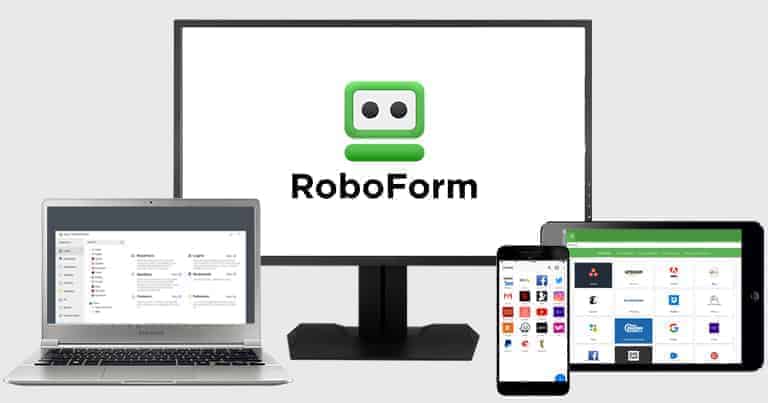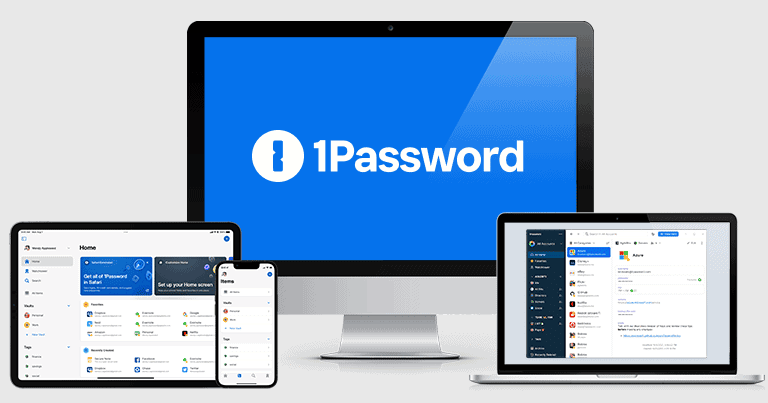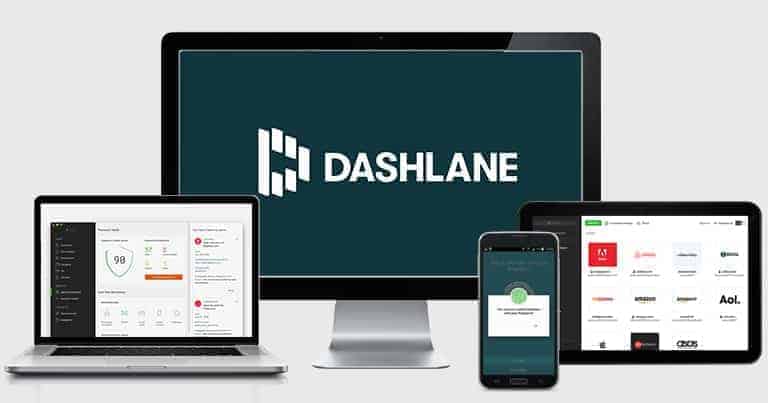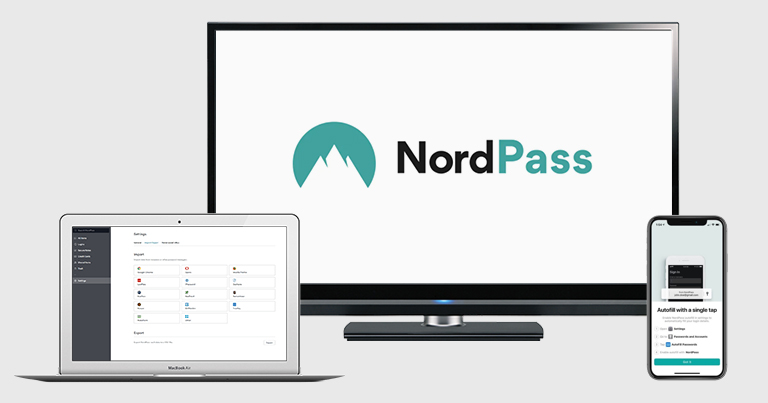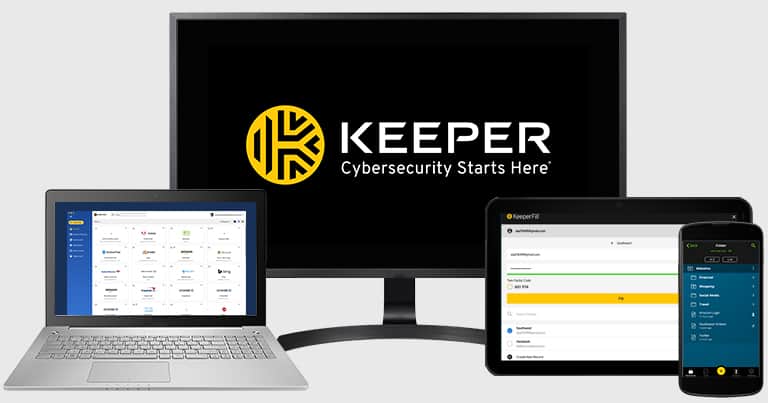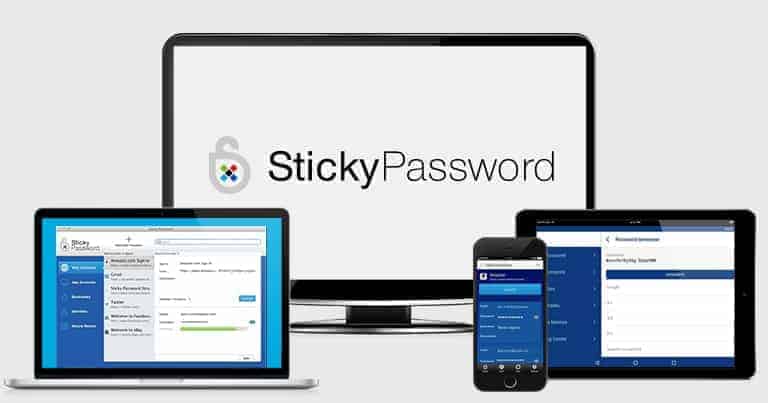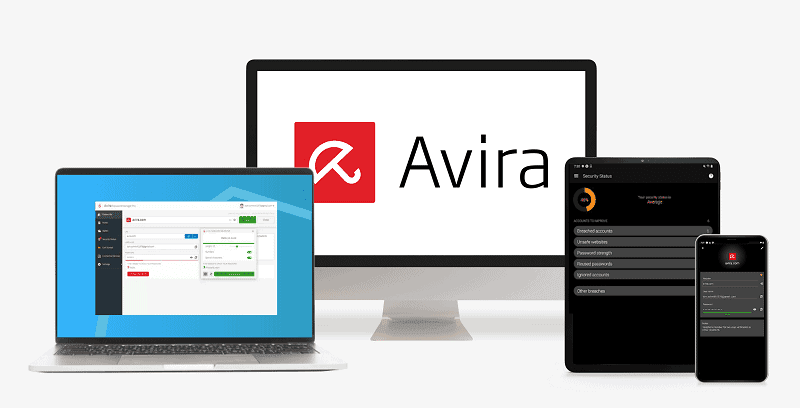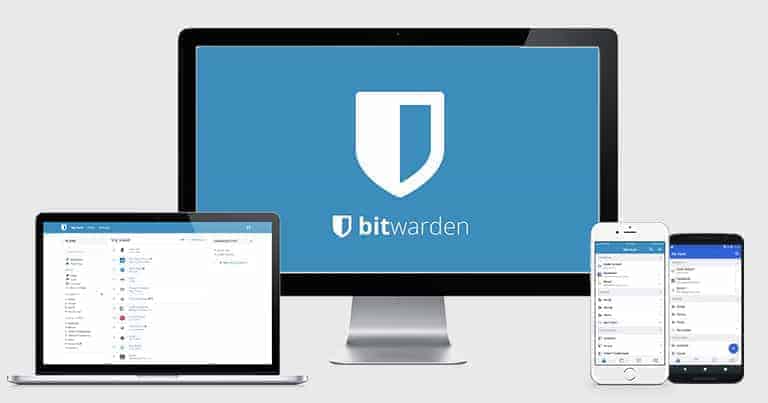
Updated on: January 2, 2026
- 🥇 RoboForm : A secure, easy-to-use password manager that stores and autofills your logins and online forms across all major devices and browsers using zero-knowledge AES-256 encryption. It offers a free plan for unlimited passwords on one device, but you can also opt for premium, family, or business plans with more features and broader compatibility.
I tested 30+ password managers to find the absolute best for 2026. I wanted to find affordable options that achieve the highest level of security while being easy to use. Now, that may sound impossible, but it’s not!
Features like auto-fill, biometric logins, passkeys, and vault sharing make managing passwords easy and secure. The more of these a password manager includes, the higher it ranks for me.
But features alone don’t make a password manager good. There are tons of bad options out there. Many are ineffective, overly complicated, and way too expensive. However, the password managers on this list have top-notch security and provide many excellent features for a reasonable price.
Based on my tests, RoboForm has everything you need in a password manager. It combines the most dependable autofill system I’ve tested with zero-knowledge AES-256 encryption, particularly for complicated multi-field web forms. At a lower cost than the majority of premium competitors, it also provides robust password generation, passkey support, secure sharing, and wide compatibility across all major platforms.
Quick Summary of the Best Password Managers in 2026
December 2025 update: We’ve updated the vendor order based on our latest tests. Additionally, some of the reviews were optimized to reflect our test results and improve readability.
🥇1. RoboForm — Best Overall Password Manager With Excellent Auto-Filling Capabilities
RoboForm has the best form-filling capabilities of any password manager I tested. While top competitors like 1Password and Dashlane fill out several types of common web forms, RoboForm can auto-fill even the most complex web forms in just one click. This is super convenient, and it stopped me from worrying about entering typos on important forms — especially when the form obfuscated what I was typing in.
- Best form-filling tool
- Desktop app
- Super affordable
- Local storage mode
- Limited dark web monitoring
With RoboForm, you can create multiple “Identities” for web forms with 7 pre-built categories of information, including passport, credit card, and vehicle info (you can also make your own template). During my tests, I could quickly fill out all types of web forms — from basic ones like social media logins to advanced ones like online accounting forms — with zero errors or missed fields!

RoboForm also comes with:
- Multiple 2FA options.
- Password security auditing.
- Data breach monitoring.
- Passkey support.
- Secure password and note sharing.
- Local-only storage option.
- Secure bookmark storage.
- Emergency access.
- Cloud backup.
- And more…
RoboForm is very easy to use. In my tests, I could easily share logins with other users, grant emergency access to trusted contacts, and check my password vault for weak, repeated, or otherwise compromised passwords. RoboForm supports biometric logins, has a built-in authenticator, and also works with popular 2FA apps like Google Authenticator.
Rare among password managers, RoboForm can also auto-fill logins for desktop applications on Windows as well as mobile apps. I tested it on Spotify and Zoom and was pleased to see it worked perfectly.

RoboForm also provides a password-sharing feature, which I found very secure and user-friendly in my tests. That said, it falls short on permission options for individual items. When you share an individual item, the recipient can only view it — there’s no option to let them edit or share it further.
One of my favorite things about RoboForm is the secure bookmark storage, which allows users to save and sync bookmarks from a desktop browser onto any device with RoboForm installed. This feature worked perfectly in my tests, enabling me to access all my favorite sites on all my devices instantly.
RoboForm is one of the best-value password managers. RoboForm Free has form filling, password strength auditing, 2FA, cloud backup for 1 device, and secure bookmark storage (a unique RoboForm feature). You’ll need RoboForm Premium to sync data and get cloud backup across unlimited devices. RoboForm Family is the same but adds licenses for up to 5 users.
All plans are significantly cheaper than most other password managers — RoboForm Premium is just $0.89 / month, whereas Family costs only $1.42 / month, making RoboForm one of the top choices for users on a budget. RoboForm backs all plans with a 30-day money-back guarantee.
Bottom Line:
RoboForm is a great password manager with the best form filler out there. It also comes with top-notch security extras like 2FA, password strength auditing, secure bookmarks storage, secure cloud storage, emergency access, and more. RoboForm’s free plan comes with a 30-day free trial of RoboForm’s Premium plan, which is more affordable than most competitors. All RoboForm purchases have a 30-day money-back guarantee.
Read the full RoboForm review >
🥈2. 1Password — Feature-Rich and Intuitive Password Manager
1Password is highly secure, feature-rich, and intuitive. It protects user data with unbreakable 256-bit AES encryption (the same standard that banks and militaries use), and it has a zero-knowledge policy, which means not even 1Password employees have access to any of your data. More importantly, it doesn’t rely solely on your master password to encrypt/decrypt passwords: it generates a secret key during account creation that never leaves your device.
- Unique extra features
- Excellent auditing tool
- Streamlined, intuitive apps
- Great family plan
- No free plan
- No money-back guarantee
When it comes to two-factor authentication (2FA), 1Password gives you tons of options, from SMS codes to authenticator apps and USB keys. Plus, there are biometric logins on all the major platforms. Depending on your device, you can also use a fingerprint scan or facial recognition to access your vault.
1Password is great for secure credentials sharing: you can create multiple vaults and share access for one vault while ensuring you don’t accidentally share sensitive items in another vault.
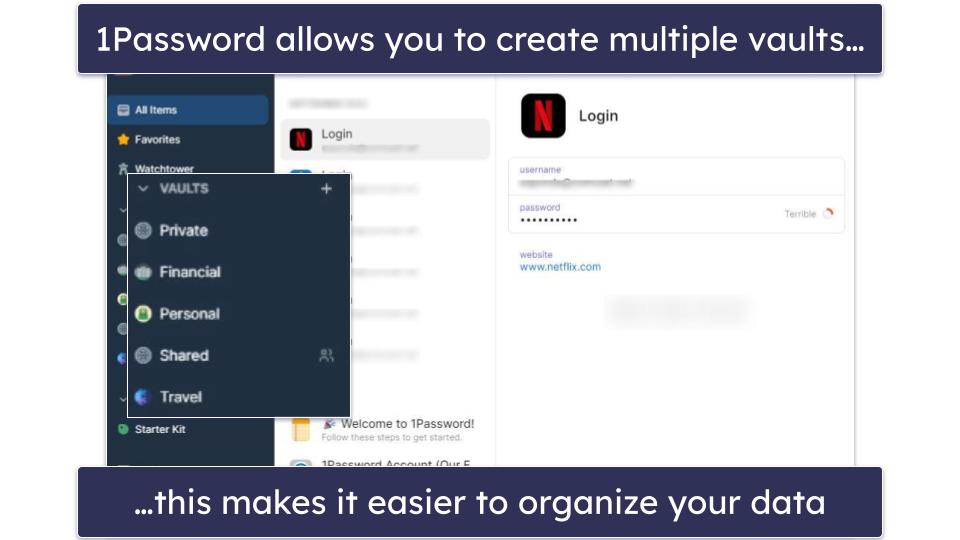
1Password also lets you share individual logins with anyone — even if they don’t use 1Password. Psst! (Password Secure Sharing Tool) generates links you can email to whoever you choose to share the details of a login, and you can set the amount of time before the link expires. This can be anything from an hour to a month or even after 1 person has viewed the link. It’s a handy feature for sharing things like your Netflix account details with guests who might not use 1Password.
1Password includes a lot of other security features:
- Watchtower. Scans the dark web and public databases for breaches, audits your vault for security, and helps you add passkeys and 2FA.
- Travel Mode. Hides sensitive passwords from the vault so intrusive border checks can’t access private data.
- Privacy cards. Provides virtual payment cards for masking your debit card number when making online purchases (available to US users only).
- Masked email. Disguises your real email address behind a unique alternative email (paid add-on).
I prefer Watchtower over all other auditing tools. In addition to checking for breached, reused, and weak passwords, it also highlights accounts that could benefit from 2FA and passkeys, something most competitors don’t do. It even alerted me to credit cards that were about to expire.

1Password has done a great job of integrating passkeys. Passkeys are a convenient and safe alternative to traditional passwords. You won’t need to remember a username or password, and your login information won’t be stored on a physical server. All you need is a PIN or biometric data to log in.
With 1Password’s Families plan, you get vaults for 5 people, but you can add more for an extra fee. Even better, it comes with 5 guest slots, like RoboForm’s Family plan. Guests can access shared data but don’t get their own vaults. Plus, 1Password’s intuitive vault-sharing functions make it super easy to share passwords with family members while keeping personal accounts private.
1Password’s individual, family, and business plans offer lots of great features for less than most competing brands. There’s no free plan, but 1Password starts at $2.99 / month, and you can test it with a 14-day free trial to decide if it’s right for you.
Bottom Line:
1Password is a secure and intuitive password manager with an easy-to-use interface and many useful features, such as hidden vaults, virtual payment cards, and more. 1Password also has affordable individual and family plans — offering unlimited user additions for a nominal fee. Its plans come with a 14-day free trial.
Read the full 1Password review >
🥉3. Dashlane — Best Password Manager With Additional Security Features
Dashlane is highly secure, easy to use, and includes many features that other brands don’t. During my tests, Dashlane performed exceptionally well in all areas — its web-based app, browser extensions, and mobile apps all worked as intended. I had no problems generating passwords, syncing data across all of my devices, and auto-filling basic and advanced web forms.
- Unlimited-data VPN
- Great dark web monitoring
- Responsive chat support
- Sharing limited to Dashlane users
- Doesn’t support YubiKeys

Dashlane also comes with:
- VPN (with unlimited data).
- Dark web monitoring.
- Password sharing.
- Password strength auditing.
- Passkey support.
- Account recovery.
- Anti-phishing protection.
- Secure file storage (1 GB).
- And more…
Overall, Dashlane’s features are useful, intuitive, and work as promised. I especially like Dashlane’s password strength auditing feature — it audits your entire password vault and alerts you if any passwords are weak, reused, or compromised. If Dashlane flags some of your passwords, you can use its password generator to change them to extra-strong, unhackable ones.
Dashlane is the only password manager on this list that comes with a VPN (virtual private network) — and it’s secure, fast, and compatible with popular streaming sites.

While any password manager’s auto-fill feature doubles as phishing protection, Dashlane alerts you if you visit a fake site resembling Dashlane. On the premium plans, it’ll also warn you if you’re copy-pasting info from Dashlane onto a website not associated with that login. It’s a great way to prevent an all-too-common human error from causing big problems.
Dashlane has 2 premium plans for personal use, which are more expensive than RoboForm — Premium ($4.99 / month) or Friends & Family ($7.49 / month) plan. Dashlane Premium has more features (including a VPN with unlimited data) and functionality than most password managers. Dashlane’s plans are all backed by a 30-day money-back guarantee.
Bottom Line:
Dashlane is secure, easy to use, and has many excellent features — like password security auditing, password sharing, dark web monitoring, 2FA, and more. It’s also one of the only password managers out there with a VPN (and it’s a pretty good VPN). Dashlane offers a 30-day free trial of the Premium plan, and all Dashlane purchases come with a risk-free 30-day money-back guarantee.
Read the full Dashlane review >
4. Proton Pass — Intuitive Password Manager With Unlimited Email Aliases
Proton Pass is one of the best password managers in 2026. Built by the team behind Proton Mail and VPN, it delivers end-to-end encryption and zero-knowledge architecture, ensuring your data stays truly private — even from Proton itself. While it may not match the sheer breadth of extras in picks like 1Password, its integration with the Proton ecosystem makes it a smart choice for security-conscious individuals.
- Multiple vaults
- Advanced alias features
- Proton Sentinel
- Fewer extras than 1Password
- Pricier than some competitors
Proton Pass secures your data with 256-bit AES-GCM encryption, combined with Argon2 key derivation for added resistance to brute-force attacks. It’s open-source, audited regularly, and benefits from Switzerland’s strict privacy regulations, offering better protection against government overreach than many US or Canadian-based competitors. You’ll also find biometric unlocks across devices, support for hardware keys, integrated TOTP, and passkeys.
I really like Proton Sentinel, an advanced security tool that uses AI and human analysis to protect your account from unauthorized access. It monitors login attempts for suspicious activity, such as unusual locations or devices, and can block or challenge them in real-time. During testing, I received instant alerts when simulating logins from a new device, adding peace of mind for home users worried about account takeovers.

What sets Proton Pass apart are its privacy-centric extras:
- Unlimited hide-my-email aliases to mask your real address and fight spam.
- Integrated 2FA authenticator for one-tap code autofill.
- Dark web monitoring to alert you of leaks.
- Secure vault sharing with granular permissions.
- Passkey generation and storage for passwordless logins.
- 10 GB of encrypted storage for file attachments for sensitive docs.
I found importing passwords a breeze — CSV uploads worked flawlessly, and the browser extensions (Chrome, Firefox, Safari, Edge) captured logins without hiccups during testing. The apps are lightweight and sync instantly across my Windows laptop, Android phone, and iPad.
Password sharing is straightforward: Select items or vaults, add recipients (even non-Proton users), set view/edit permissions, and send a secure link. It’s safe and straightforward, though 1Password edges it out with more robust family vault collaboration.

Proton Pass offers integrated, unlimited hide-my-email aliases, allowing you to create unique email addresses for every signup to prevent spam and tracking. You can also use custom domains (e.g., yourname.com) for aliases, adding a professional touch while keeping your actual email address private — NordPass also offers integrated email masking, but you can’t use custom domains. In my tests, setting up a custom domain was straightforward via Proton’s dashboard, and aliases worked flawlessly across email clients and services.
Proton Pass Plus at $2.99 / year includes unlimited aliases, dark web monitoring, and 10 GB storage. The Family plan covers up to 6 users for $4.99 / year, perfect for households. The Proton Unlimited plan, at $9.99 / year, bundles Pass with other Proton services like Proton Mail and VPN. Proton offers a 30-day money-back guarantee on all its plans.
Bottom Line:
Proton Pass is the best password manager in 2026 for privacy purists, blending top-tier encryption, a stellar free plan, and unique anonymity tools into an intuitive package. It’s not as feature-packed as 1Password, but its zero-compromise approach to data protection makes it a worthy addition to this list. You can test it risk-free with the 30-day money-back guarantee.
Read the full Proton Pass review >
5. NordPass — Most Intuitive Password Manager (With the Best User Interface)
NordPass is an easy-to-use password manager, and while it doesn’t include as many extra features as competitors like 1Password or Dashlane, it provides excellent password protection in an intuitive interface. This makes it one of the top choices for beginners and non-technical users in 2026.
- Easy for beginners
- Unique encryption method
- Email masking
- Lack of extras
- Limited iOS apps
NordPass uses XChaCha20 encryption. Like 256-bit AES, this encryption has never been cracked, but XChaCha20 likely has the advantage of being more future-proof. It also has a zero-knowledge policy, biometric logins on Windows, Mac, and mobile devices, and many multi-factor authentication (MFA) options.
NordPass includes quite a few extra features, too:
- Passkey support.
- Password health checker.
- Password sharing.
- Dark web monitoring.
- Email masking.
- Emergency access.
- 3 GB of secure file storage.
NordPass comes from the cybersecurity team behind NordVPN (one of our top VPNs in 2026). I had no trouble importing my passwords, generating new ones, or saving new logins through NordPass’s excellent browser extensions during my tests.

NordPass makes sharing passwords really easy, too. All you have to do is enter the email addresses of the people you want to share your passwords with, choose how much access you want to give them, and click Share. It’s not as in-depth as 1Password’s password sharing (which lets you share entire password vaults), but it’s still really good.
I also like how NordPass gives premium users 3 GB of secure file storage. There are no limitations on what file types you can upload with NordPass (provided the individual files don’t exceed 50 MB).
It also comes at a low price, with plans starting from $1.29 / month. There is a free version, but you can only be signed in on 1 device at a time, which is a bit of a hassle. Upgrading to NordPass Premium gets you simultaneous coverage on unlimited devices and unlimited password sharing, and upgrading to NordPass Family comes with the same features, but it adds licenses for up to 6 users for $2.79 / month.
Bottom Line:
NordPass has a streamlined, intuitive interface, making it a good choice for users looking for a simple and easy-to-use password manager. It uses one of the strongest encryption methods on the market and has zero-knowledge protocols and decent MFA options. You can try out NordPass with a 30-day money-back guarantee.
Read the full NordPass review >
6. Keeper — Most Secure Password Manager
Keeper is an intuitive password manager with a very high level of security — 256-bit AES encryption, a zero-knowledge policy, passkey support, and a wide variety of MFA options, including compatibility with 2FA apps like Google Authenticator and advanced options like face and fingerprint logins on both desktop and mobile devices.
- TOTP authenticator
- Encrypted chat app
- Customizable templates
- Breach alerts require an add-on
- Limited password generation on mobile
In addition to being very secure, Keeper is extremely easy to use. It reliably auto-saved and auto-filled my credentials, and I also found it incredibly simple to share logins with other users as well as set up specific sharing permissions. The One-Time Share feature offers a secure way to share a login with a friend or family member. Like 1Password, Keeper even lets you share with users who don’t use the same password manager.

Keeper also lets you store a wide variety of other information in your vault. It has 20 templates to input details like your driver’s license, birth certificate, health insurance, memberships, software licenses, and more. That said, the form-filler isn’t as versatile as RoboForm’s.
The additional features Keeper offers include:
- Secure messaging (KeeperChat).
- Passkey support.
- Encrypted cloud storage (10 GB on the family plan).
- Password security auditing.
- Dark web monitoring (paid add-on).
The free encrypted messaging app (KeeperChat) is one of the things I love the most about Keeper. It comes with a wide range of options for securely sending and receiving messages, including message retraction, self-destruction, and a private gallery for storing photos and videos. You can also store up to 5 files through the web dashboard.
Keeper Personal offers unlimited passwords across unlimited devices, password sharing, and multi-factor authentication for $1.67 / month. Keeper Family adds up to 5 licenses and 10 GB of cloud storage for $3.54 / month. Optional add-ons for both plans include dark web monitoring and up to 100 GB of cloud storage. There’s also a very limited free version — it doesn’t include most of Keeper’s features and can only be used on 1 mobile device with a maximum of 10 records.
Bottom Line:
Keeper is a high-security password manager offering all the protections you need to manage your passwords safely. It comes with a ton of cybersecurity features — strong encryption, password strength auditing, an encrypted messaging app, and more secure storage (10–100 GB) than any other competitor. You can test all of Keeper’s premium features with a 30-day free trial.
7. Norton Password Manager — Best Antivirus + Password Manager Combo
Norton Password Manager is a free password manager by Norton. It comes with industry-standard security, including unbreakable 256-bit AES encryption, zero-knowledge architecture, 2FA, biometric logins on mobile, and extras like password vault auditing.
- Completely free
- Easy to sync
- YubiKey support
- Dark web monitoring requires upgrade
- Very limited form templates
- Generator limited to web dashboard
Norton Password Manager offers unlimited password storage on unlimited devices, which is rare in a free product (Avira Password Manager is another good antivirus-bundled password manager that doesn’t have password or device limitations).
However, Norton Password Manager is missing many security features that come with brands such as RoboForm or 1Password — it doesn’t have password sharing or a built-in authenticator, for instance.

Norton 360 (the cybersecurity suite Norton also develops) includes more features than almost any competitor. Priced at $49.99 / year*, Norton 360 Deluxe has perfect malware detection rates, extras like a VPN, parental controls, dark web monitoring, and intuitive apps for all major platforms.
Bottom Line:
Norton Password Manager is a decent password manager that comes bundled with the best internet security suite on the market. It’s straightforward and secure but lacks features like password sharing. However, Norton’s antivirus plans include all the internet security features you need to keep your device and data safe. The Password Manager is free while all Norton purchases are backed by a risk-free -day money-back guarantee.
Read the full Norton Password Manager review >
8. Sticky Password — Portable USB Version & Local Storage
Sticky Password is a basic but intuitive password manager. It comes with some pretty useful features — including local data storage and a portable USB version of the program (very few competitors offer these features). However, it doesn’t offer as many features as other competitors.
- Affordable lifetime plan
- Great ‘portable’ option
- Unique sync option (WiFi)
- Outdated app with unintuitive setup
- No file storage
You can choose where to store your data — in Sticky Password’s secure cloud or on your local network. It’s cool being able to store passwords, credit cards, and other personal information locally, but I like to keep mine in the cloud so I can access them anywhere.
Sticky Password’s USB password manager is excellent. It allows you to load a portable version of the password manager onto a USB flash drive, which you can use to access your passwords and other personal data on any Windows PC. Even if you lose the USB stick, your data remains safe because you’ll still need the master password to access your information. Contactless Connect offers similar utility, but instead of a USB stick, you can use the mobile app to access your vault on any desktop device.
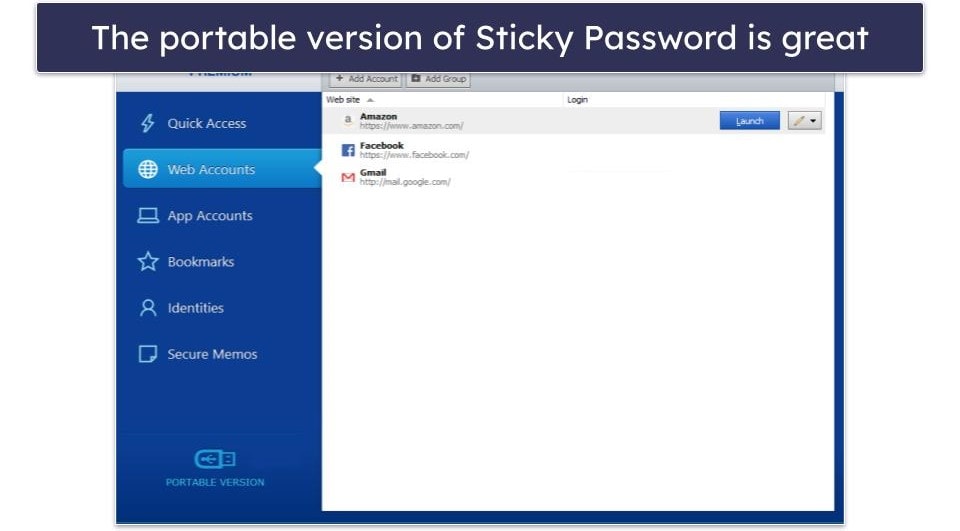
Sticky Password is also very intuitive and easy to use. In my tests, I could easily share passwords with other users, and the auto-save and auto-fill functions worked just as intended. I also like how Sticky Password lets you save and auto-fill logins for specific Windows apps like Skype and Zoom. Besides RoboForm, not many other premium password managers offer this function.
The free version of Sticky Password includes unlimited passwords on 1 device, 2FA, secure notes storage, and the portable USB version. Upgrading to Sticky Password Premium adds unlimited devices, password sharing, and cloud or local storage for $29.99 / month. Best of all, you can get lifetime access for a one-time payment of $79.99 / lifetime. If you’re interested, Sticky Password offers a 30-day money-back guarantee on all plans.
Bottom Line:
Sticky Password has all the essential password management features plus some unique extras, like local data storage and a portable version of the program. Sticky Password Free comes with a 30-day free trial of Sticky Password Premium, and all Sticky Password purchases have a risk-free 30-day money-back guarantee (plus each premium purchase benefits Save the Manatee Club — a non-profit dedicated to manatee conservation!).
Read the full Sticky Password review >
9. Avira Password Manager — Easy Setup & Intuitive Features
Avira Password Manager is very easy to set up and use, which makes it great for non-technical users. While there isn’t an Avira Password Manager desktop app, I like Avira’s clean-looking and intuitive browser extension. The iOS and Android apps are also very intuitive, with easy-to-navigate features.
- Built-in TOTP generator
- 60-day money-back guarantee
- Good bundle options
- Limited 2FA options
- No password sharing
- Imperfect auto-fill
Avira offers a decent set of features, including unlimited password storage, multi-device sync, auto-fill, data breach alerts, password security auditing, and 1 GB of secure file storage. The mobile apps are better than the desktop versions as they support biometric logins and include a built-in 2FA authenticator.
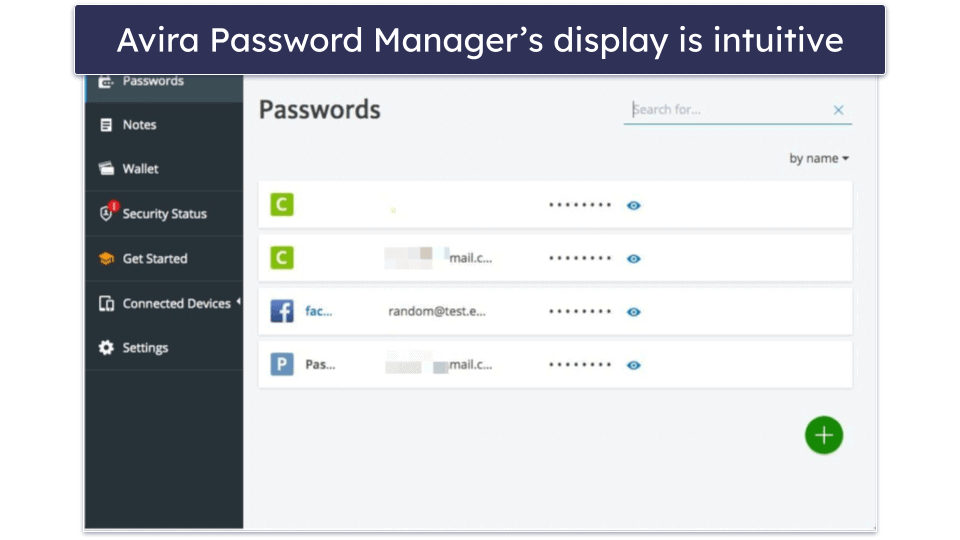
Avira offers most of its password manager features for free, but to access password security auditing and data breach alerts, you need to upgrade to Avira Password Manager Pro, which costs $2.66 / month. While the Pro plan is pretty affordable, it isn’t as well-rounded as top competitors like RoboForm and 1Password. It also doesn’t add that many new features compared to the free version. That said, Avira Password Manager is a good choice for users who need an intuitive password manager that works exactly as promised.
You can also get Avira’s password manager as part of Avira Prime, one of the best and most affordable internet security suites in 2026. Avira Prime Includes an excellent malware scanner, web protection, a VPN, system optimization tools, and more. It covers up to 5 devices across all operating systems and costs only $59.99 / year. Avira backs all purchases with a generous 60-day money-back guarantee.
Bottom Line
Avira Password Manager is intuitive and comes with a decent set of features, including data breach alerts and 1 GB of secure file storage. It isn’t as advanced as well-established competitors like RoboForm and 1Password — I’d like to see Avira add features like password sharing, emergency access, and more 2FA options, and have better auto-fill capabilities — but it’s very easy to set up and use and comes with a 60-day money-back guarantee.
Read the full Avira Password Manager review >
10. Password Boss — Good Value With Customizable Emergency Access
Password Boss is a user-friendly password manager. It has an intuitive interface and well-designed, useful features — including secure password sharing, basic 2FA, password strength auditing, and cloud storage.
- Easy to use
- Flexible emergency access
- Remote data wipe tool
- Highly limited customer support
- Disappointing password generator
- No web vault
Password Boss doesn’t have many features that set it apart from top competitors, but it’s secure, easy to use, and has all essential password management functions, plus a few useful extras.
I really like Password Boss’s customizable emergency access function. It enables trusted contacts to access specific passwords in an emergency — this is something I haven’t seen offered by most other password managers.

Additionally, Password Boss offers a digital wallet for securely storing credit cards, bank details, and other personal details. It also has a really intuitive and well-designed password-sharing function, and I like how you can share passwords without the recipient actually seeing them, preventing your data from being inadvertently exposed.
Password Boss’s Premium plan costs $2.50 / month — while this is cheaper than most competing brands, it does lack some of the functionality of its top competitors. There’s also a free plan, but it is limited to 1 device, and you can only share up to 5 passwords. Password Boss comes with a 30-day money-back guarantee.
Bottom Line:
Password Boss is an intuitive password manager with some useful extras. It doesn’t have any unique features, but it has all the tools most users need to securely store passwords, including password sharing, password auditing, emergency access, and more. It’s a good choice for non-technical users, and you can try it out with a free 30-day trial and a 30-day money-back guarantee.
Read the full Password Boss review >
Bonus. Bitwarden — Best Open-Source Option
Bitwarden is an affordable open-source password manager with excellent security features. It protects user data with industry-standard security features like 256-bit AES encryption, a zero-knowledge policy, passkey integration, and a wide range of 2FA options, along with advanced extras like local hosting option, password security auditing, and email aliases.
- Self-hosting
- Very affordable
- Open source
- Clunky design
- No recovery option
- Buggy auto-save
Bitwarden also has a pretty good free plan — it allows unlimited password storage across unlimited devices and unlimited password sharing with 1 other user. Most top password managers limit you to only 1 device and don’t allow password sharing on their free plans.

While Bitwarden is easy to use, it’s less intuitive than other password managers. Its interface is less user-friendly than 1Password and Dashlane, and while auto-save and auto-fill worked well for passwords, auto-filling credit card details sometimes led to missed fields, which never happened with RoboForm.
Bitwarden Premium comes with all of the features mentioned above for a single user and costs $1.00 / month, while the Families plan is priced at $3.33 / month and covers up to 6 users. The premium plans are covered with a 30-day money-back guarantee.
Bottom Line:
Bitwarden is an open-source password manager with advanced security features, including local hosting, passkey support, password security auditing, data breach monitoring, and a built-in 2FA authenticator. While Bitwarden is generally easy to use — with straightforward installation and simple password importing — its interface isn’t as intuitive or user-friendly as some top competitors. However, Bitwarden offers very affordable plans backed by a 30-day money-back guarantee.
Read the full Bitwarden review >
Bonus. Total Password — Reliable Password Manager With Remote Logout
Total Password offers useful features, such as the Secure Me remote logout tool and vault auditing. Like most options on this list, it uses 256-bit AES encryption to secure your accounts and has a strict no-logs policy. However, it’s not as feature-rich as my top recommendations (for example, it doesn’t offer password sharing or encrypted storage).
- Flawless auto-save/auto-fill
- Included with great antivirus bundle
- Effective ad/tracker blocker
- No password sharing
- Doesn’t support passkeys
That said, Total Password has a straightforward and intuitive interface. Its auto-save and auto-fill functions work perfectly, and the customizable password generator is good, too.
The Secure Me tool is useful if you have a lost or stolen device or if you’ve accidentally left your device unlocked at another location. For example, I once forgot to log out of a public terminal at the airport. I could remotely log out of my Total Password account with Secure Me. You can also use it to log out of all websites you’re logged into and to delete your browsing history, which is pretty handy.

As an added bonus, Total Password also comes bundled with Total Adblock — a separate browser extension that effectively filters out ads across various platforms. Additionally, it protects your browsing data from third-party trackers.
Total Password can be bought as a standalone product at $1.99 / month or as part of the TotalAV Total Security bundle $49.00 / year. Personally, I’d choose the bundle since it offers more security — with an excellent antivirus (its the #1 antivirus in 2026), a secure VPN, good optimization tools, and more. There’s a 30-day money-back guarantee on all plans.
Bottom Line:
Total Password has a good range of essential features and a few unique additions, like the Total Adblock tool. It lacks some of the extra features seen in competitors, but it’s secure, easy to use, and reasonably priced. And if you opt for the TotalAV Total Security bundle, you’re getting quite a bit more value for your money.
Read the full Total Password review
Quick Comparison Table
How Do Password Managers Work?
Password managers serve as encrypted repositories for sensitive information. Most are able to instantly pull up stored data when it’s required, automatically filling in forms so long as access has been authenticated, usually through a master password. All of my top picks use end-to-end encryption, zero-knowledge architecture, and other security measures to ensure that no one, not even the password manager itself, can see what you store in your vault.
In practice, they work very well with minimal input required from the user. When you enter a username and password on a website or app, the password manager offers to save it. Once saved, the password is immediately encrypted using an algorithm, usually 256-bit AES encryption. This encrypted data is stored in an unreadable form either locally on your device (for offline tools) or securely synced to encrypted servers (for cloud-based services).
When you revisit a site, the password manager detects login fields through HTML identifiers. To auto-fill your credentials, you first need to unlock your vault, typically using a master password or biometric verification. The manager then decrypts the relevant data and fills your login into the correct fields (RoboForm is notable for its ability to handle complex forms with all manner of custom fields). For added safety, most promptly clear the decrypted data from memory, leaving no trace of your private information.
Not every password manager can handle this process reliably. Due to faulty reading of HTML and other issues, auto-save and auto-fill are far from seamless with lots of popular password managers.
Finally, beyond storing and entering passwords, most top brands come with additional tools. Strong password generation, secure password sharing, and password auditing are all fairly standard extras. Some of my top picks stand out in large part because of their bonus features. For example, Dashlane has safe emergency access options and a bundled VPN, while 1Password has a nifty Travel Mode and virtual payment cards, which allow you to hide your actual card number when making purchases online.
Testing Methodology: Comparison & Ranking Criteria.
I used our comprehensive testing methodology to find the leading password management solutions in 2026. Here’s how I determined each product’s ranking:
- I tested the security and encryption standards to ensure they use 256-bit AES encryption or similar, incorporate zero-knowledge protocols, and offer 2FA or MFA. Only the password managers that provided solid security measures were considered for this list.
- I assessed the ease of use across desktop and mobile apps, ensuring that the interfaces were intuitive and user-friendly. I also extensively tested auto-save and auto-fill functions (RoboForm excelled in this) and gave extra points to password managers that included passwordless and biometric logins (at least on mobile, but preferably on desktop as well), and convenient secure sharing.

- I looked into the additional features offered, separating genuinely useful tools from flashy extras. I sought features that add real value, such as masked emails, extensive dark web monitoring, and encrypted cloud storage. Unique functionalities, like 1Password’s Travel Mode and Dashlane’s VPN, were also assessed for their practical benefits.
- I tested customer support responsiveness and resource availability, contacting support teams and utilizing their help resources to gauge the quality and speed of assistance provided. Effective support channels and informative resources were crucial criteria.

- I analyzed the pricing and value offered, comparing the cost of services against the features provided. Affordability, free trials, and money-back guarantees influenced the final assessment. RoboForm’s great price and overall functionality earned it the highest spot on this list, for example.
How to Select the Best Password Manager for Your Operating System in 2026
Alongside your general preferences and needs, your operating system will help determine which password manager is best for you. Some companies excel on all platforms (RoboForm is my top pick across the board thanks to accurate autofill, strong security, and dedicated apps across all major operating systems), while others have gaps, like limited mobile functionality. Here’s what you need to know:
- Best password managers for Windows. Our top pick for Windows 10 and 11 is RoboForm, which combines a full set of features, a reliable desktop app, and consistent form‑filling performance.
- Best password managers for Mac. Mac apps usually offer similar features to Windows, so rankings don’t differ much. RoboForm and 1Password are our top choices for macOS due to robust security and smooth cross-platform syncing.
- Best password managers for Android. Some Android apps lack features or polish compared with desktop versions, but RoboForm and Dashlane stand out for intuitive design, strong autofill, and secure storage.
- Best password managers for iOS. On iOS, RoboForm is our favorite for seamless integration with Face ID/Touch ID, consistent form autofill, and simple, reliable password management.
Quick Guide: How to Use a Password Manager
- Go to the official website of your password manager of choice. From there, navigate to the product or plans/pricing pages.
- Choose the plan that’s best for you and follow the instructions. All password managers will ask for your email; most require additional information.
- Set up your account. You’ll be prompted to create a master password. Make sure it’s something you’ll remember but can’t be guessed by anyone. Some password managers will also prompt you to generate and save a recovery key. Keep this code safe in offline storage, as you’ll need it if you forget your master password.
- Download the password manager. Some password managers have desktop apps, while others rely on a mix of mobile apps, browser extensions, and online dashboards. Whatever the case, you’ll be told what you need to download.
- Learn about the password manager’s features. Once downloaded and installed, most password managers will provide a mini tutorial that teaches you how to set up and use the service.
- Import your passwords. It’s easy to import all your passwords into your new password manager. If you have passwords saved in your browser, a different password manager, or a .csv file, you can follow instructions on how to import them. The process varies a bit depending on the password manager, but most will walk you through every step. It’s also possible to add passwords manually.
- Test out the password manager’s auto-fill by logging into a site. If your username and password for a particular site are saved in your vault, the password manager should automatically fill in your credentials. RoboForm did an exceptional job with the auto-fill and has multiple templates to help you out.
- Finally, explore the password manager’s other features. Some services will let you share passwords, audit your passwords, store encrypted notes, or even hide passwords when you’re outside your home country (this is a unique 1Password feature). You might also want to take the time to organize your password vault into categories like financial, streaming, and personal information.
Can Password Managers Be Hacked?
Although none of the password managers from my list have ever had their users’ data stolen, it’s important to acknowledge that some well-known password managers have suffered security breaches. For example, LastPass suffered a major data breach in 2022, in which encrypted customer data (including usernames and passwords) and unencrypted metadata were exposed. These incidents were not isolated, as the company also faced attacks in 2015 and 2021.
Although we no longer recommend LastPass, there are some lessons to be learned from its example, the most important one being that users should stay proactive about their security. This means you should always research a password manager before buying a plan and take care to really understand its features.
Additionally, never forget the importance of a strong master password. This is critical because even if your computer or phone is hacked, uncrackable encryption means that the intruder won’t be able to view the passwords in your vault if they don’t know your master password. Further, zero-knowledge architecture means that any issue on the company’s side needn’t compromise your sensitive data.
All that said, I highly recommend enabling additional security measures, such as biometric authentication and 2FA to stay safe even if your master password is somehow leaked. Finally, you should consider using a VPN on public Wi-Fi, and using an antivirus with advanced phishing protection.
Remember, human error, such as weak passwords or falling for phishing scams, poses a much bigger danger than the possibility of a password manager being breached.
Passwords vs. Passkeys — What Is the Future of Password Managers?
Passwords play a crucial role in our online lives, yet they have limitations. Even the strongest passwords can be vulnerable to phishing attacks and data breaches. Plus, it’s easy to forget a password — although password managers help, you’ll still need to remember a master password to access all others, which is still vulnerable to keyloggers. Besides, remembering even a single password can be challenging.
Passkeys are a secure and convenient alternative to traditional passwords. When you sign up for a service that uses passkeys, you won’t be asked to pick a username or a password. Instead, the site or app will generate a unique set of connected passkeys — one public and one private.
Passkeys are safer than passwords because your login credentials aren’t stored on a physical server. With passkeys, only the public key is stored on the website servers you registered on. Even if hackers compromised that site’s servers, they would only gain access to your public key, which is useless on its own. Your private key is stored on your chosen authenticator, which can be a device or another piece of software.
Logging in with passkeys is incredibly simple — all you need to do is open the app or visit the website you want to log into, select the passkey you want to use, and verify your login attempt on your chosen authenticator using biometrics, a PIN, or a pattern. You’ll then be logged in “automatically,” without providing any username or password.
What happens behind the scenes is asymmetric encryption — the website you visited uses your public key to encrypt a “challenge” that it sends to your device. The challenge (think of it as a sort of puzzle) is then “signed” on your device using your private key and sent back to the website. The website then uses your public key to decrypt your signature and logs you in.
There are many benefits to using passkeys. They’re fast and convenient because you don’t have to memorize or type any passwords. In fact, you wouldn’t be able to see your passkey even if you wanted to, so that rules out human error as a risk factor. They’re also super secure, because they’re long, encrypted, and impossible to guess or crack. Plus, they’re basically immune to phishing attacks because each passkey can only be used on the website or app that created it.
For the time being, there aren’t many websites or apps that support passkeys, but with all the benefits and positive attention, that’s bound to change soon. In the meantime, all of the password managers on this list offer 256-bit AES encryption, zero-knowledge architecture, and 2FA to keep your passwords secure.
Password Managers for Individuals vs. Password Managers for Businesses — What’s the Difference?
Every good password manager needs industry-standard security features, like top-notch encryption (256-bit AES, usually), zero-knowledge architecture, and two-factor authentication (2FA), as well as basic features such as a password generator, auto-save/auto-fill, and multi-device sync. RoboForm is an example of a personal password manager that covers all these basics while providing reliable cross-platform functionality.
Nevertheless, there are some differences between personal and business password managers.
Business solutions need to have an admin role that can set password requirements and monitor for potential issues. Streamlined onboarding/offboarding, easy integration into a company’s existing computer systems, and intuitive dashboards are likewise essential.
Second, business password managers need to provide secure password sharing with different levels of permissions. Top brands like RoboForm and 1Password let you create vaults and choose which team members can access which vault — very convenient for bigger companies with lots of teams and departments. Dashlane allows admins to share specific passwords with specific team members (and also to revoke access to a password at any time).
Finally, business password managers must offer advanced security features and policies, like multiple SSO options, developer integrations, and breach monitoring.
You can read more about the best password managers for businesses of all sizes here.
Why We No Longer Recommend LastPass
LastPass was once a top-tier password manager, but its recent history of severe security breaches has shaken user confidence and prompted us to remove it from our lists. The company’s failure to adequately protect user data is a dealbreaker for us at SafetyDetectives.
In December 2022, hackers compromised a developer’s account to access source code and technical information, then leveraged this to breach cloud storage backups containing encrypted customer vault data and unencrypted metadata, ultimately exposing sensitive user information.
What’s particularly worrying is the possibility that the stolen data continues to be exploited to this day. In December 2024, reports surfaced about a major cryptocurrency theft that involved hackers exploiting data from the stolen LastPass vaults.
While LastPass maintains that there is insufficient evidence to link the recent theft with the 2022 breach, we recognize that, for a password manager, trust is essential, and in the case of LastPass, users’ trust has been undermined by the company’s history of security incidents (attacks also happened in 2021 and 2015).
Given these issues, we can no longer recommend LastPass as a reliable password manager. Instead, we recommend password managers with a stronger track record of security and transparency, like RoboForm or 1Password, neither of which have had user data exposed in a breach.
Top Brands That Didn’t Make the Cut
- True Key. Despite being owned by cybersecurity giant McAfee, True Key lacks many features offered by the other brands on this list, including password security auditing and password sharing. In addition to being a bare-bones password manager, True Key was also pretty buggy in my testing.
- Zoho Vault. Zoho Vault is a decent business password manager with good security and good password management features for teams. However, since it was created for business purposes, it’s not good for individual and/or family use.
- KeePass. KeePass is an open-source password manager that’s completely free but lacks many essential features like auto-saving, vault auditing, and password sharing.
Frequently Asked Questions
Is it safe to trust a password manager with all of my passwords?
Yes — all of the password managers on this list use either 256-bit AES or XChaCha20 encryption, which makes your password vault unreadable without your master password. They have zero-knowledge security policies, which ensure that no one (not even the password manager’s developers) can access and decrypt your passwords.
Each also supports a variety of two-factor authentication (2FA) methods. Enabling 2FA adds an extra layer of security to your account. Some are limited to basic methods like a code sent to your email, phone, or authenticator app, while others (like Keeper) support advanced methods like USB keys.
How does zero-knowledge work in password managers?
Zero-knowledge means only you can access your stored passwords. The password manager never sees or stores your master password or unencrypted data on their servers. Even the company itself cannot access or read your information.
Because the company cannot read your data, they can’t share it with anyone else, including governments or any other third parties, even if they wanted to or were legally compelled to do so. Your sensitive data remains private and secure, as only you can unlock it with the key. All password managers on this list use zero-knowledge architecture.
Are all password managers the same?
Many of the top password managers offer similar features — securely saving and storing passwords, generating new passwords, and syncing across multiple devices. But, there are a lot of things that set them apart. Ease of use, encryption methods, multi-factor authentication options, browser extensions, desktop/mobile apps, and overall value can vary widely between different password managers.
For example, RoboForm’s form‑fill accuracy tends to be stronger than many rivals, especially on complex multi‑field pages. 1Password has a lot of extra features, which can benefit families and enterprises. Dashlane bundles additional privacy tools like a built‑in VPN and live dark web monitoring, making it more security-oriented.
What are passwordless options?
Passwordless options are authentication methods that don’t require entering a traditional password. Instead of relying on something you know (like a password), passwordless authentication often relies on something you have. This can make the authentication process more seamless and, in many cases, more secure. Some common passwordless methods include biometrics (fingerprint or face scan), security tokens, and mobile push notifications.
Many password managers (such as RoboForm) are also implementing passkey support. Passkeys are gaining traction as they eliminate the risk of password breaches or weak passwords and improve user experience (no more forgotten passwords!).
What if I forget my master password?
Forgetting your master password can cause problems. Most password managers don’t include ways to retrieve or reset it. However, some of the best password managers include account recovery options such as:
- Password hints — When you create your master password, you’ll be asked to set up a hint that’ll jog your memory without giving away your password.
- Emergency contact — Some password managers, like NordPass, let you set an emergency contact who can access your account in extreme circumstances. This can be used as a form of account recovery and should be someone you trust deeply.
- Two-factor authentication — Some services offer two-factor authentication (2FA). This adds an extra layer of security and can also help recover your account if you’re locked out.
- Recovery key — Certain password managers, like 1Password, give you a unique recovery key when you sign up. Store this somewhere safe.
In short, try not to forget your master password. If you do, these recovery options could be your lifeline — but bear in mind that not all password managers provide account recovery options, so this is something to check before you sign up.
Do I really need a password manager?
You probably do. If you have multiple online accounts, you most likely don’t remember all of your passwords unless they’re either very simple or you only have one password. Both situations leave you extremely vulnerable to having your accounts broken into, so you likely need something to store and recall your online logins.
Password managers have a lot of benefits:
- Password generation — A password manager coupled with a password generator can heighten cybersecurity in a few seconds — RoboForm’s password generator can create passwords up to 512 characters long!
- Convenience — Having spent countless hours of my life forgetting, trying to remember, and having to reset my passwords, using a password manager is a real time saver.
- Security — Password managers prevent keyloggers and screen loggers from watching you type your passwords on-screen. Most password managers also include secure data sharing between users. Some of them even monitor the dark web for security breaches, like 1Password’s Watchtower.
Cloud vs. local password storage: what is more secure?
Local storage is more secure, but it also has its downsides. When you sync your passwords locally, your data never actually leaves your device — but this also makes it difficult (or at least inconvenient) to sync your passwords across all of your devices. Top brands like RoboForm offer users the option to choose whether to store passwords locally or on their servers.
On the other hand, cloud-based password managers like Dashlane use very secure servers to store encrypted user data (the data is encrypted using military-grade encryption, which has never been breached). And because user data is online, in the cloud, these password managers automatically sync all your passwords, so you can easily and conveniently access your password vault on all your mobile and desktop devices.
Why shouldn’t I store passwords in my browser?
Storing passwords in your browser is convenient, but it can be dangerous. Simply put, anyone who gains physical or remote access to your device and web browser can easily get ahold of your passwords.
However, when you use a password manager like RoboForm or 1Password, all of your passwords are encrypted using 256-bit AES encryption (the same type of encryption used by banks and militaries), and no one can access your passwords without a master password. All of the top password managers have zero-knowledge policies, meaning that no one — not even their technical staff — knows your master password.
Additionally, when you use a dedicated password manager, you can sync your passwords across all browsers and operating systems, so all of your passwords are readily available to you whenever you need them. Plus, they have lots of useful extra features.
Do password managers work with apps?
Yes, a select few password managers are designed to work with applications, allowing the storage and auto-fill of login credentials for various apps on your device. This feature, found in password managers like RoboForm and Sticky Password, streamlines the login process across not only websites but also various applications on your computer or mobile device, like Zoom, Spotify, or Netflix.
